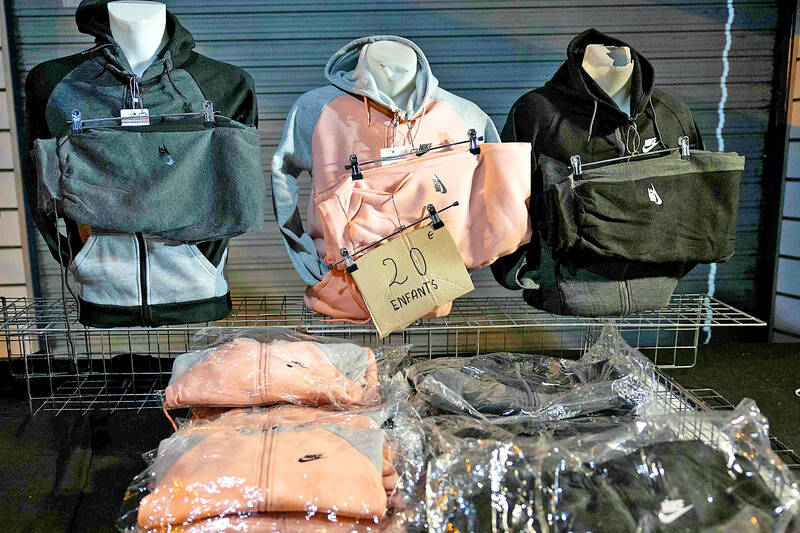Counterfeit products — mainly clothes — cost the European economy 16 billion euros (US$17.42 billion) a year and result in nearly 200,000 lost jobs, the EU Intellectual Property Office said yesterday.
The findings, based on data from 2018 to 2021, show that fakes take the biggest toll on the clothing sector, costing 12 billion euros annually, or 5.2 percent of its overall revenues, the agency said.
Fake cosmetics account for 3 billion euros of losses, while toys represent 1 billion euros, although the office added that “counterfeiting, like any illegal activity, cannot be accurately measured.”

Photo: AFP
It based its findings on the number of items seized by police as well as the percentage of Europeans who admitted to buying counterfeit products in each country in the bloc.
A study from June last year found that one-third of Europeans deemed it acceptable to buy fake goods if the price of the authentic item was deemed too high — a percentage that rose to half of all youth respondents.
The bulk of the counterfeiting occurred in just five EU member states, with Germany, France, Italy, Spain and Austria accounting for half the yearly losses.
Based on the findings, Germany was losing 40,000 jobs a year, Italy 24,000, and France and Spain 15,000 jobs each, the agency said.
Separately, Uniqlo, part of Fast Retailing Co, sued Chinese retailer Shein in Japan, accusing it of copying its popular Round Mini Shoulder Bag.
The entities that operate the Shein brand must immediately cease sales of “imitation products” and compensate for damages, Fast Retailing said in a statement yesterday.
The bag, sold for about ¥1,500 (US$10.23) in Japan, has become a global hit, with Uniqlo warning consumers about counterfeits and similar products being sold online.
Fast Retailing joins rival Hennes & Mauritz AB in suing Shein for copyright infringement in Hong Kong, where litigation aimed at mitigating the threat posed by the Chinese rival has been under way since 2021.
Uniqlo filed the lawsuit against Roadget Business Pte, Fashion Choice Pte and Shein Japan Co on Dec. 28 at the Tokyo District Court.
“The company filed this complaint because it has determined that the form of the imitation products sold by Shein closely resembles that of its own product,” Fast Retailing said in the statement. “The sale of the imitation products by Shein significantly undermines the high level of customer confidence in the quality of the Uniqlo brand and its products.”

Intel Corp chief executive officer Lip-Bu Tan (陳立武) is expected to meet with Taiwanese suppliers next month in conjunction with the opening of the Computex Taipei trade show, supply chain sources said on Monday. The visit, the first for Tan to Taiwan since assuming his new post last month, would be aimed at enhancing Intel’s ties with suppliers in Taiwan as he attempts to help turn around the struggling US chipmaker, the sources said. Tan is to hold a banquet to celebrate Intel’s 40-year presence in Taiwan before Computex opens on May 20 and invite dozens of Taiwanese suppliers to exchange views

Application-specific integrated circuit designer Faraday Technology Corp (智原) yesterday said that although revenue this quarter would decline 30 percent from last quarter, it retained its full-year forecast of revenue growth of 100 percent. The company attributed the quarterly drop to a slowdown in customers’ production of chips using Faraday’s advanced packaging technology. The company is still confident about its revenue growth this year, given its strong “design-win” — or the projects it won to help customers design their chips, Faraday president Steve Wang (王國雍) told an online earnings conference. “The design-win this year is better than we expected. We believe we will win

Chizuko Kimura has become the first female sushi chef in the world to win a Michelin star, fulfilling a promise she made to her dying husband to continue his legacy. The 54-year-old Japanese chef regained the Michelin star her late husband, Shunei Kimura, won three years ago for their Sushi Shunei restaurant in Paris. For Shunei Kimura, the star was a dream come true. However, the joy was short-lived. He died from cancer just three months later in June 2022. He was 65. The following year, the restaurant in the heart of Montmartre lost its star rating. Chizuko Kimura insisted that the new star is still down

While China’s leaders use their economic and political might to fight US President Donald Trump’s trade war “to the end,” its army of social media soldiers are embarking on a more humorous campaign online. Trump’s tariff blitz has seen Washington and Beijing impose eye-watering duties on imports from the other, fanning a standoff between the economic superpowers that has sparked global recession fears and sent markets into a tailspin. Trump says his policy is a response to years of being “ripped off” by other countries and aims to bring manufacturing to the US, forcing companies to employ US workers. However, China’s online warriors